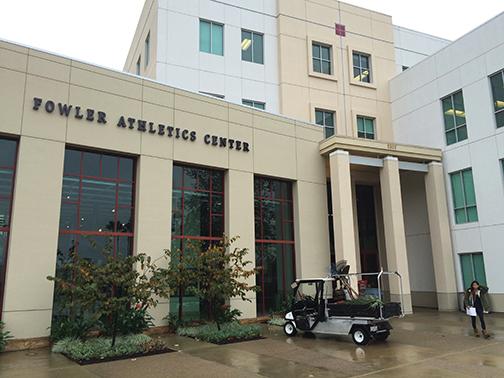The SDSU athletic department recently received a $1.25 million donation to help launch a scholarship program for student-athletes.
Donations from Robin and Bill Sinclair will help fund the Coryell Legacy, which is part of the athletic fundraising program Aztec Club.
“We hope our gift will provide scholarships for athletes that may not otherwise have had a chance to attend college, long into the future,” Robin Sinclair said. “Since our gift is unrestricted, we trust the athletic department to choose students interested in both playing a sport in college and getting their degree.”
Although the Sinclair’s are not alumni, they are big fans of SDSU athletics. They have season tickets for football and basketball, and they also attend volleyball, baseball and softball games.
According to a press release the Coryell Legacy, which was named after top-winning Aztec football coach Don Coryell, will be funded through endowments and estate gifts for Aztec Athletics.
Associate Athletic Director Bob Moosbrugger said the gift means the Sinclair’s have left the athletic department in their trust.
“Their commitment shows their commitment to SDSU Athletics and our need for scholarships,” Moosbrugger said. “This gift will allow us to create an endowment in their name that will continue to give forever.”
The Coryell Legacy has an endowment goal of $20 million to attempt to stabilize the financial future of the athletics department and the success of its student-athletes.
More than 298 student-athletes were recognized as scholar athletes this year, which is 30 more than last year, according to the Aztec Club website.
A scholar athlete must have a 3.2 GPA per term or a 3.0 cumulative GPA.
Special fitness senior Kristina Rivas believes that students should only receive a scholarship if they are doing well academically.
“I do not think it is fair that they pick a student-athlete that isn’t doing academically well rather than a student that is doing academically well to give a scholarship to,” Rivas said. “I understand some student-athletes receive scholarships because they cannot financially afford it but what about all the other students that cannot financially afford school? They just get the option to pull out more loans.”
Other students believe that the student-athletes should apply for scholarships like any other student.
“I think all students including the athletes should have opportunities, but it would only be fair if the athletes applied for these scholarships just like everyone else,” biology freshman Tien Pham said.
Scholarships are based on the limited number of scholarships the NCAA allows. Student-athletes in football, men’s and women’s basketball, women’s volleyball and women’s tennis receive a full scholarship if awarded. In all other 14 sports that SDSU sponsors, the coaches can determine how much of a scholarship a student-athlete will receive. NCAA rules determine these scholarship guidelines, Moosbrugger said.
Aztec Club’s goal is to provide scholarships for all of its student-athletes. The athletic scholarship campaign has secured more than $7.4 million, according to the Aztec Club website.
SDSU athletics grants 420 students some sort of scholarship, if not a full scholarship.







